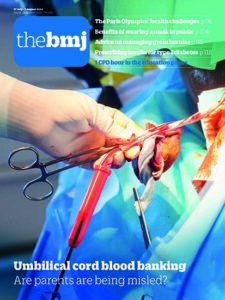
Questions over safety and effectiveness of new Alzheimer’s drug
Investigation raises concerns about excess deaths, missing safety data, questionable effectiveness, and financial ties among expert advisors
7 of the 8 doctors on review panel received direct payments from drug companies
The safety and effectiveness of donanemab – an Alzheimer’s drug recently approved by the US Food & Drug Administration (FDA) – is called into question in an investigation published by The BMJ today.
Journalists Jeanne Lenzer and Shannon Brownlee explore concerns not only about its effectiveness and the number of deaths among patients taking the drug, but also about financial ties to drug makers among the “independent” advisory panellists who recommended approval.
Donanemab, developed by Eli Lilly, is the latest in a new class of anti-amyloid drugs that deliver antibodies to target beta amyloid, a protein believed to cause Alzheimer’s disease.
In January 2023, the FDA denied approval of donanemab, citing a “high rate” of missing data and questioning the drug’s long term safety. The agency noted a higher rate of treatment discontinuation due to adverse events (frequently brain hemorrhage and swelling) among patients on donanemab compared with placebo, and an “imbalance” in overall deaths.
Lilly acknowledged three deaths in patients on donanemab, and an outside company it hired to obtain the missing data found two additional deaths among patients in the donanemab arm and five deaths in the placebo arm.
But Steven Goodman, an expert in clinical trial design at Stanford University, says it is not possible to assess the reliability of the new data without more details of the outside company’s methods.
“There was also no information on health outcomes in those patients other than death, nor the causes of the deaths,” he says, adding that the “failure to formally follow patients who stopped treatment was a significant design flaw, particularly when that discontinuation was partly due to adverse drug effects.”
The investigation also reveals that seven of the eight doctors appointed by the FDA to review donanemab received direct payments from drug companies.
Three had financial ties to Lilly, two had ties to Roche, Lilly’s development partner in creating a new blood test for Alzheimer’s disease, and two others have patents on amyloid antibodies, and the eighth doctor had research funding from Janssen for another Alzheimer’s drug.
Using the public database OpenPayments, members’ CVs, disclosures in published articles, and the Google patent ownership database, The BMJ found that individual advisers received up to $62 000 (£47 000; €56 000) for consulting and speaking fees and up to $10.5m in research grants from 2017 through 2023.
Asked about the extensive financial conflicts among the physician advisors found by The BMJ, the agency stated, “The FDA does not comment on matters related to individual members of an advisory committee.”
Lenzer and Brownlee also describe how the main (primary) outcome of the donanemab trials was changed during the trial from the widely accepted “clinical dementia rating scale—sum of boxes” (CDR-SB) to Lilly’s own integrated Alzheimer’s disease rating scale (iADRS).
And despite results failing to show a clinically meaningful difference between patients on the drug and placebo, Lilly stated that donanemab slowed progression of Alzheimer’s by 22%. The company has also promoted donanemab as “slowing decline by 35%.”
“That is a misleading statement,” says Alberto J Espay, a neurologist and specialist in clinical epidemiology and healthcare research at the University of Cincinnati. “That’s a relative difference that transforms a very tiny absolute difference into a number that seems impressive.”
[Ends]
26/09/2024
Notes for editors
Investigation: Donanemab: Conflicts of interest found in FDA committee that approved new Alzheimer’s drug doi: 10.1136/bmj.q2010
Journal: The BMJ
This investigation was produced in partnership with the McGraw Center for Business Journalism at City University of New York’s Craig Newmark Graduate School of Journalism.
Link to Academy of Medical Sciences press release labelling system:
http://press.psprings.co.uk/
Externally peer reviewed? No
Evidence type: Investigation
Subject: Conflicts of interest





